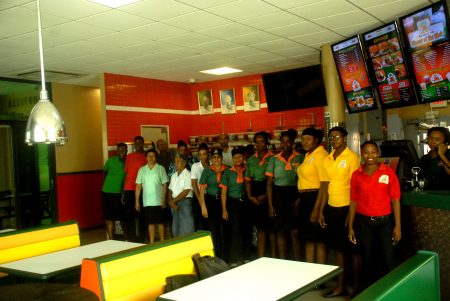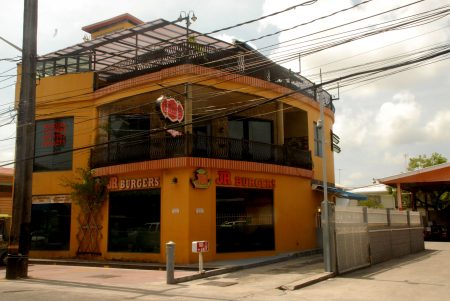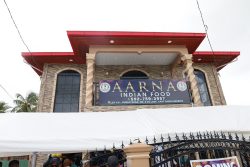Challenged by a limp economy and a wave of competition from internationally-branded fast food franchises, Jad and Ryan Rahaman are busying themselves seeking to restore the fortunes of J.R. Burgers, an establishment that had its origins in a mobile hamburger bar on the Georgetown sea wall and which, today, is represented in a multi- million dollar complex which, even now bears the scars of the trying times which the businessmen are facing.
You don’t have to probe the Rahamans too deeply to determine where the shoe is pinching. The Silhouette, which, for a while, was regarded as one of the more pleasing fine-dining services in the capital is now closed as is The Altitude, a high-rise night club that has been part of the Sandy Babb street complex. The re-opening of the Altitude, Jad says, is awaiting the resolution of “programming challenges” for an elevator that does not now provide transportation for revelers to the topmost floor of the complex, where the Altitude sits. J.R. Burgers alone, amongst the family of services still stands inside the complex.


Before the advent of the complex J.R. Burgers operated out of a modest building adjacent to where the new building now stands. In those days their hamburgers, shakes and Jamaican Patties generated sizeable drop-in crowds though the small clutch of tables for ‘eat-in’ customers at the entrance to the facility probably never worked as well as had been hoped. Jad concedes that the environmental discomfort associated with proximity to the street and the dust and vehicle fumes that went with it was a disincentive to customers congregating there.
Competition can be a game-changer in business and so it has been for J.R. Burgers. Spoilt for choice by the rapid arrival of assorted fast food franchises in the country, J.R. Burgers has, increasingly, had to share a limited market with ‘new-faced’ rivals, all of them exhaustively branded and ready to offer the latest ‘trimmings’.
What is readily apparent about Jad Rahaman is that he is a practical businessman. When you suggest that J.R. Burgers has been a victim of the Guyanese consuming public being ‘spoilt for choice,’ he readily concedes; except that he hastily makes the point that local food service providers ought to benefit from concessions that allow them to trade on an even footing with imported franchises.
There is no shortage of entrepreneurial background in the Rahaman clan. Over time, Jad himself has been involved mining, tourism and has run the Palm Court, arguably Guyana’s most popular Night Club. J.R. Burgers was a graduation from an experiment that began more than twelve years ago to coincide with the increasing popularity of the sea wall as the city’s most popular hangout spot.
The Sandy Babb street ‘upgrade’ around 2005 was, the Rahamans say, an attempt to “raise the bar.” It worked…………..for a while at least, until the foreign franchises intervened.
Where turning around the fortunes of J.R. Burgers is concerned, Jad says that it has not been for the want of trying. The current wave of innovations includes excursions in diversification into some of the variants of the fast food regime…like barbecues and the doubles. These have not been able to bring back the good times.
Assumptions that had to do with a near captive market having been undermined by wider customer choices, J.R. Burgers, Jad Rahaman says, is now focused on reinventing itself. He understands that investment in enhancing facilities to offer the same clutch of products has not really worked and now there is a greater preparedness to focus on marketing J.R. Burgers in different ways. When Stabroek Business spoke with the Rahamans on Tuesday evening they were talking about the possibility of broadening even further the range of entertainment options being offered by the entity. That apart, they were entertaining options for enhancing the ambience of the complex which is now only partially used for business. The going, they say, is tough but their confidence in the brand remains undiminished.









